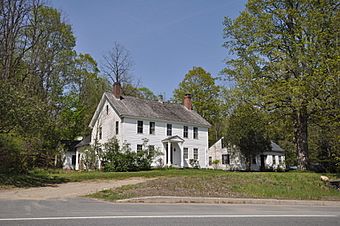West Townshend, Vermont facts for kids
Quick facts for kids |
|
|
West Townshend Village Historic District
|
|
 |
|
| Location | Roughly Main St. from Old Rt. 30 to VT 30 and Town Rds. 7, 23, 47, 49, and 50, Townshend, Vermont |
|---|---|
| Area | 80 acres (32 ha) |
| Built | 1800 |
| Architect | Parkhurst, Samuel; Et al. |
| Architectural style | Greek Revival, Queen Anne, Federal |
| NRHP reference No. | 86001502 |
| Added to NRHP | September 11, 1986 |
West Townshend is a small, historic village located in the town of Townshend, Vermont. It sits by a bend in the West River, upstream from the Townshend Dam. The entire village is so special that it's listed on the National Register of Historic Places as the West Townshend Village Historic District. This means it's recognized for its important history and unique buildings.
Contents
Exploring West Townshend Village
Where is West Townshend Located?
West Townshend is found in the central western part of Townshend, Vermont. It's right at the northern edge of a curve in the West River. The river flows north from the west, goes around this curve, and then heads south towards the Townshend Dam.
The river valley here has steep hillsides. But the flat area near the river, called a floodplain, gets wider at the bend. This wider area was perfect for farming a long time ago. Most of the village buildings are spread out along Vermont Route 30. This road was built higher up to stay safe from the waters of Townshend Lake, which was formed by the dam. A few smaller roads go north from Route 30, following little streams. There are also some houses on an older part of Route 30 at the west end of the village.
A Look Back in Time: West Townshend's History
The town of Townshend was officially started in 1753. However, people didn't begin to settle there until the 1760s, after the French and Indian War.
Samuel Fletcher, who was from Massachusetts, came to the area that is now West Townshend. Around 1785, he built the very first wooden house in Townshend. Part of that house still stands today in the southeastern part of the village!
The village grew because of sawmills and gristmills built along Tannery Brook. Sawmills cut wood, and gristmills ground grain into flour. The village was busiest and had the most people and businesses in the mid-1800s.
Challenges and Changes
West Townshend faced a big challenge during the New England Hurricane of 1938. This powerful storm caused a lot of damage to the village. Later, in the 1950s, the construction of the Townshend Dam changed the village even more. Building the dam meant that Vermont Route 30 had to be moved to a new path.
In 1986, the village was officially named a historic district and added to the National Register of Historic Places. This helps protect its important buildings and history. One special building in the district is the West Townshend Stone Arch Bridge. It was built by a local person named James Otis Follett in the early 1900s and is located on one of the town roads off Route 30.
 | Chris Smalls |
 | Fred Hampton |
 | Ralph Abernathy |



